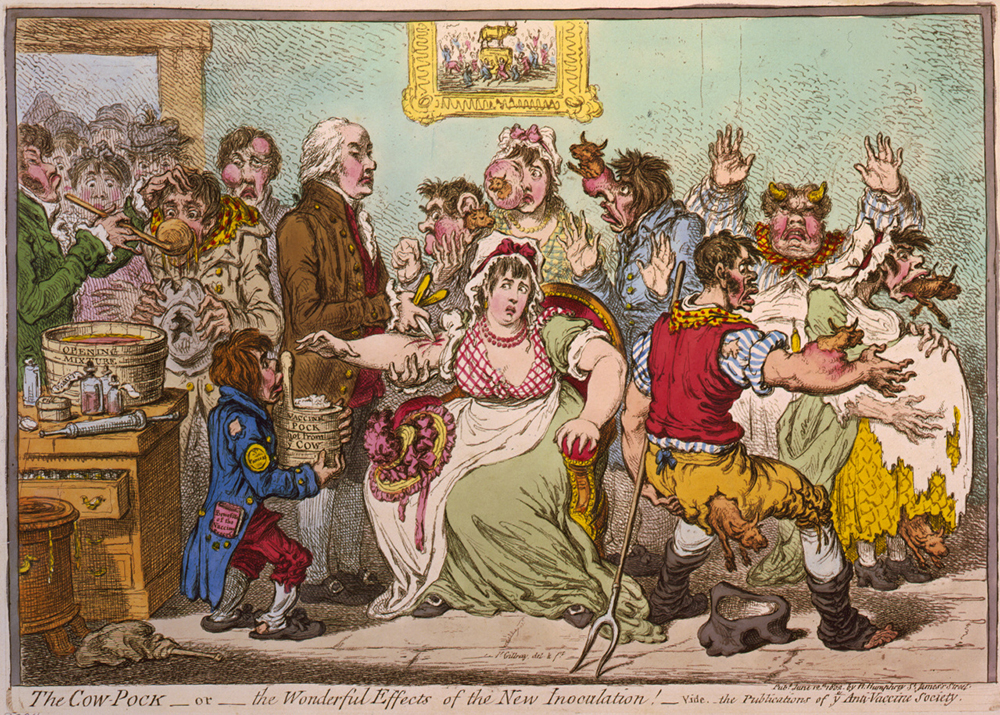Geneva, 23 November, 2020
In 1797, an English physician named Edward Jenner reflected on the widespread observation that milkmaids were generally immune to smallpox. He undertook an inoculation or “variolation” (later to be termed “vaccination”) from a cowpox pustule on a milkmaid’s hand into the arm of a young boy called Phipps (the son of Jenner’s gardener.) This prevented Phipps from contracting smallpox later when Jenner exposed him on multiple occasions to the much-feared disease. The experiment proved successful in a further 23 cases. And all this with no understanding of microbes! Jenner sent a paper to the Royal Society that was never published. But word was out.

The practice spread rapidly around the world despite criticism that included sanitary, religious, scientific, and political objections. By 1802, an active Anti-vaccine Society stoked fears – rational and irrational – about the smallpox vaccination. The UK government would later pass the Vaccination Act of 1853 making compulsory the vaccination of children aged less than three months; this spawned the Anti Compulsory Vaccination League. Serious outbreaks of smallpox in the USA toward the end of the 19th century were tackled by vaccination campaigns that were in turn opposed by activists. The Anti-Vaccination Society of America was founded in 1879. Needless to say, a global coordinated vaccination campaign eventually allowed the World Health Organisation to declare the eradication of smallpox in 1980.
The Financial Times reported last week that on the day that Pfizer and BioNTech announced the development of a vaccine that effectively protects against COVID-19, shares in Pfizer rose by 7% and Pfizer’s Chief Executive, Albert Bourla, sold US$5.6 million of his own stock. In trying to understand whether this was legal, whether this indicated Mr Bourla’s lack of faith in the product or whether he was expecting imminent emergence of competition – that would then drop the value of Pfizer’s shares – I found myself sliding down a rabbit hole into the kaleido-warren of high finance.
It’s obvious where I’m going with this. In the months to come, the world news in relation to the COVID-19 pandemic will be dominated by the development, production, distribution, administration and effect of the vaccine and opposition to it. This media hot topic will inevitably coincide with and be linked to an ever-increasing number of COVID-19 cases in the USA and how the outcome of the extraordinary election there plays out.
The bases of reservations about or total opposition to COVID-19 vaccines are many and varied. The vaccine is not safe. The vaccine is not needed. The vaccine is not effective. The whole exercise is too expensive. You can’t trust doctors and scientists. Vaccination is one big scam run by pharmaceutical companies. Vaccination should not be compulsory. Governments can’t be trusted. The WHO is corrupt. Vaccination is not natural. Vaccination runs against God’s order. Vaccination is the means for governments to insert microchips into our bodies. There are others more competent than me WHO have ready answers to all the above.
The voices of those against the vaccine will become all the more powerful via blogs, on-line news and social media. Disinformation and conspiracy theories spread and can take on a life of their own and so become credible. Here we arrive at what I want to say in this blog. Be very careful with respect to what you read, hear and believe about COVID-19 vaccines. Knowing about the Dunning-Kruger effect may help you.
We all like to read stuff that resonates with what we already believe but most of us have the capacity to put our own beliefs into question when presented with reasonable counter-arguments. The Dunning-Kruger effect is when people with low ability tend overestimate their ability. Thus, some people may believe they are superior because they are unable to recognise their lack of ability. Dunning summed it up as “If you’re incompetent, you can’t know you’re incompetent … The skills you need to produce a right answer are exactly the skills you need to recognize what a right answer is.” It follows that intelligent people have the ability to question whether they have the right answer. Those who do NOT ask themselves whether they have the right answer are susceptible to having their self-overestimation reinforced by interacting with others who also have not asked themselves whether they have the right answer. Think extremist politics, devotion to ultra-religious creeds, biker gangs etc. (If you’ve read this far you are probably not subject to the Dunning-Kruger effect!) It goes without saying that the internet in all its forms unleashes one great accelerator of the Dunning-Kruger effect. In relation to the subject at hand, it potentially allows equal voice to the leading public health scientists of the day and Elvis-says-NO-to-vaccines. This is just one example of what Barack Obama recently referred to as “truth decay.”

Duh!
Donald Trump blasted his way into the MMR vaccine / autism debate. On 4 September 2014, he tweeted “So many people who have children with autism have thanked me – amazing response. They know far better than fudged up reports!” Just before the 2016 US election, I flew to my hometown, Norwich, in the UK. I jumped into a taxi. The driver seemed like a nice guy. We got talking. It was soon apparent that he admired Mr Trump. The soon-to-be-President Elect’s intelligence was, apparently, evident by what he had to say about vaccines. I nodded. The subject turned to Brexit. Unsurprisingly, my driver was all for it. Fair enough. Just before we got to my destination, he said, “I see it like this… Britain ruled the world before we were part of the European Union. Britain won’t rule the world again until we leave the European Union!” I paid my fare and got out of the taxi. I stood by the roadside, stunned. How, I asked myself, do people come up with ideas like that and feel comfortable voicing them to strangers? I know now: the Dunning-Kruger effect.

Excellent!